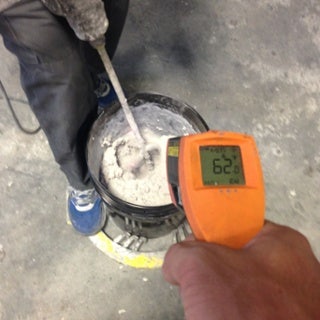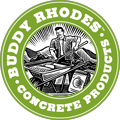Cold Matters | Preparing For The Cold Weather
Concrete seems like a simple building material. It is really a grand chemistry exercise. A matter that is of the great importance when dealing with most anything related to chemistry- temperature. Here are some things to consider as the seasons change, both on the issue of creating with concrete, as well as managing your materials when the cold comes.
Ordering And Shipping Liquids
Most of the liquid materials we offer- sealers, polymers, glazes and so on- have some amount of freeze stability. That said, it is better that these materials don't freeze, and multiple freezing cycles can ruin the products in some cases. Keeping the products unfrozen can be difficult during shipping when boxes are sitting in an uninsulated truck driving through the frigid winter. Here are a few precautions and considerations that can be taken to ensure the best results.
-Order on Monday. This increases the likelihood that your box wont sit at an unheated transfer station over the weekend, dramatically reducing the chance for freezing.
-Ship especially important packages overnight to reduce the exposure to freezing temperatures.
-Let our Customer Service Team know if you want special precautions to be taken. We are happy to deliver your package via 'white glove service' if that is what you fancy, but we need to hear from you if that is the case.
-If something shows up to you frozen, let it thaw out normally. Once thawed, give the material a shake and view to see if everything is homogeneous and in suspension. If there is separation, or if you are unsure, then give us a call and we can speak more in depth on the issue.
-A good rule of thumb- it never hurts to ask. We are here to help you, let us know how we can do that.
Making Concrete
We spend the summer talking about getting ice in your mix to cool things down, now what happens when everything cools off? When concrete is able to get beyond the initial set period, it will begin to generate heat as a result of the chemical reaction of hydration. If this heat is maintained, the reactions continue and the concrete gets hard. If the concrete is too cold to get past the initial set, or the heat from hydration is allowed to escape, then hydration (curing) is going to slow down. How much? That depends on conditions. Here are some tips to improve conditions.
-Raw materials have a thermal mass. If you can manage the temperature of the raw materials, then you are well on your way. This is easier to do when the materials get hot, as you can add ice in your mix to cool the raw materials. If you add too much ice to your mix water, then you are just running the risk that you are going to be slowed down a bit, but the mix itself will be naturally fluid and easy to work with. If you just add hot water to your mix to warm up the materials, the line between perfect and too hot is a bit more dangerous to travel. If you overdo the hot water, the mix will set up rapidly as you have triggered the chemical reaction of hydration. You are essentially pushing a train downhill at that point, and it could prove hard to bring back. Try to keep the raw materials warm.
-Cold conditions are going to slow the casting process timing. Be patient.
-Once you are cast, then you need to insulate the concrete. If you can sufficiently insulate the concrete, once the heat begins to be generated from hydration, it will feed on itself. Heating blankets are not a bad idea in many conditions, or you can use numerous moving blankets. Look at the concrete and ask yourself "If I was going to sleep right there, would I be warm with that many blankets?" Whatever number of blankets you would be happy with, double it.
-There are ways to manage the cold if you are mindful about the process. The best route is to be able to temperature control your situation.
Sealing Concrete
Concrete is like your skin, when it is cold pore structure is tight, when it is warm the pore structure is open.
+
Sealer is reliant on some type of chemistry, and chemistry prefers heat.
=
The need to control the temperatures during the sealing process.
-All of the sealers we offer are going to perform faster when it is warmer. The colder the conditions during application and just following application, the longer things will take.
-If you are looking for performance, and looking for quick turnaround times, then you need to have control of the temperature. If the spec on a sealer is to apply between 60-90 degrees, keep in mind that there is an exponential difference in that range. The speed at which reactions happen at 70 degrees as opposed to 60 degrees is dramatic.
Tools that are exceptionally helpful for managing temperature- and hand held infrared thermometer, as well as a device to measure the temperature and humidity in and out of the shop.
Control The Variables

The ultimate success in working with concrete comes when you understand and control the variables. This is true at every step of the process with the entire range of variables. The task of becoming a craftsman with concrete is a matter of learning to consider the cause and effect of the choices you make, and how those choices effect the process.
You have achieved a level of success when you are able to control your temperature, and you have taken it to the next level when you realize that in so doing you have changed the humidity in your shop. Many heating systems will dramatically reduce the ambient humidity- you solve one problem while creating a new one. This dance, going around in a bit of a circle addressing the causes and effects, is the art of the craft. It can be maddening or wonderful- the choice is yours.



